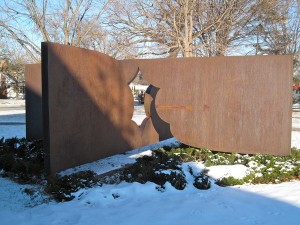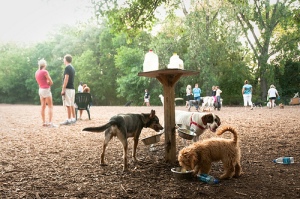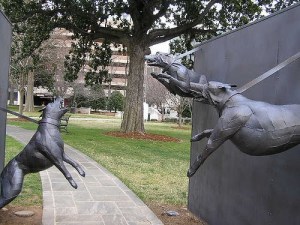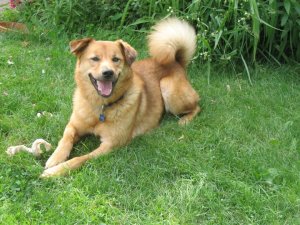When I first saw the fliers around my neighborhood for a proposed dog park in my local park, I immediately and unquestioningly signed up as a supporter. I had just recently adopted a rescue dog and had been feeling guilty about the extra driving I was doing to take him to dog parks.
I have long been a heavy user of this local park, which had been named for the slain civil rights leader Martin Luther King Jr. in 1968. I walk with my two children to the playground and the pool multiple times a week in the summer and visit less frequently in the winter for sledding. My family has barbecues there and we attend events such as the annual park festival. Certain parts of the park are busy during the summer, but is fairly large and has plenty of underused space. The proposed dog park was to occupy a small fenced area along the freeway, behind some tennis domes. Perfect, I thought. Better yet, there seemed to be a lot of local support for the proposal, including by city officials who seemed happy to have their faces attached to it.

Freedom Form No 2 sculpture at MLK park by Daniel Johnson. Photo credit Sheila Regan and Southwest Minneapolis Patch
I heard the first rumblings of trouble on my way to a public information meeting advertised by the Park Board at the park last summer. My kids were coming with me to play at the park during the meeting and some of their African American friends from the neighborhood joined us, all taking turns riding in and pulling a wagon along the way. “My grandma says that they are taking out the playground equipment and giving the whole park to dogs instead”, said one young boy. I was surprised, but thought the public information meeting would help clear up any misinformation that might be floating around.
But instead of gaining information when I walked into the meeting, I was given a red sticker and asked to use it to place a vote on a board – for or against a dog park. City officials were suddenly either nowhere to be found, or were acting curt and trying not make waves. There was no information presented other than some drawings on poster boards. I was able to gather from the whisperings in the room that some African American elders had begun to voice opposition to the dog park, a position which had taken supporters and city officials by surprise.
From that point on, I saw my neighborhood go through a public struggle over race and symbolism like I’ve not personally seen before in my part of Minneapolis, a city that like many in the US prefers to not discuss race and to think of racial conflict as a relic of the past. The media portrayed the issue as “White vs. African American” and the story was covered widely. Public meetings were punctuated with shouting and tears, and public officials would not take a stand either way – instead advocating for more and more moderated discussions. Sub committees and task forces on race and healing were formed faster than I could keep up with, yet publicly the drama continued to escalate.
On one side was mostly elder members of the African American community, some of whom did not live in the neighborhood but still held strong ties to the park. They argued that a dog park would disrespect the memory of Martin Luther King Jr, particularly since dogs were used as weapons against civil rights activists in the 1960s. They also spoke of historical discrimination in
Minneapolis and of inequities still not addressed. MLK park is clearly an important destination and symbol for many African Americans in Minneapolis, a remembered place of refuge in a segregated city, and naming the park after Martin Luther King Jr. had been an important victory back in the 1960s. Furthermore, they lamented the fact that the city had allowed the park and a memorial sculpture contained within it to fall into disrepair.
On the other side were the dog owners (mostly White) who said that they are already walking their dogs through the park anyway and that they only want a very small fenced in area to do it in instead. They argued that it would be a great community building place and a positive addition to an unused area of the park. Other nearby parks had been ruled out as potential dog park locations in the past, and MLK park was centrally located and in a more demographically diverse part of the city. Most of the rest of the dog parks in the city are located in affluent communities in Minneapolis and this would serve a broader cross section of people.
As someone who writes and reads a lot about racism and nature, I found myself surprisingly unable to make a decision. I wondered if my own initial support of the dog park was selfish, and illustrative of the fact that no matter how much Tim Wise I read, I will instinctively wield my class and race privilege when faced with an issue that affects me personally. But I also believe very strongly that urban parks should be about broad usage by the immediate populace, not about preserving or memorializing. And yet.. I took very seriously arguments that such a park could bring pain to some of my neighbors. There is no denying that historical injustices leave enduring scars, and by no means can I or should I hope to understand the struggle of anyone else.
Then I did what I should have done right away – I tuned out the media and stopped listening to the politicians and started talking to my neighbors – anyone who would listen. I got to know some of the dog park supporters better and they were a much more diverse group than the media was portraying them to be. They had worked on the proposal for years and were passionate about the neighborhood and community building. I spoke with some of my African American neighbors about the issue and they were open with me about why they opposed the park and shared their thoughts on racism in the city. One neighbor encouraged my husband and I to continue supporting the dog park even though she opposed it – she thought as a dog owner I should naturally want a dog park and that I should advocate for it. I spoke with Latino neighbors who expressed frustration with the fact that they are often an ignored demographic despite their rising numbers in the area. And what I found remarkable is how pleasant and easy to have all these conversations were. I began to think that the biggest problem wasn’t with the difference in opinion, or even difficulty in talking about race, but in how the city and the media so often interfered with the very kind of conversations I was having. When groups for and against the park had tried to have informal meetings together, city officials (who are also mostly White) had intervened and insisted that it would be a bad idea. Neither did they seem to want to lead any discussions of race or racism themselves. They instead wanted scheduled and professionally moderated discussions that could only be about either race or the dog park, but not both. The major media outlets as always were more interested in drama, and the “Black vs. White” picture they painted glossed over a lot of the nuance of the issue. White discourse in public forums sometimes fell into the co-option of symbols and civil rights struggles as they tried to argue that “Martin Luther King would have wanted a dog park”, and a few radical members of the African American community went so far as to advocate violence against people or dogs and shouted to “leave our park alone”. But outside of the meetings and the media, I continued to see positive dialog happening.
As of late January, it appears that the Park Board has finally decided to officially take a stand against a dog park at Martin Luther King park, something that is almost a relief to even many who supported the park. By the time the snow has melted this spring, some of the hurt feelings between neighbors will probably be healed. But I will not easily forget the behavior of the elected officials and the way they scrambled and dithered over the issue as soon as the topic of race came up. And I hope that the hard work the dog park supporters put into developing the plan is acknowledged, and that an alternate dog park site is selected. And I hope that the hurt feelings of the opponents of the park is also acknowledged, and that the legacy of Martin Luther King Jr can be better honored in our city. And I hope that for a while people remember that our history is filled with pain and conflict, and that until we discuss and acknowledge our past it will erupt in unexpected places in our present.
Selected links:
Planned Minneapolis Dog Park Spurs MLK Name Spat. January 17th, NPR.
Chad Hartman Talks to Civil Rights Activist Spike Moss. January 20th, WCCO Radio.
Emotion, Anger and Song at Park Board Meeting on MLK Dog Area. January 20th, Southwest Minneapolis Patch.



